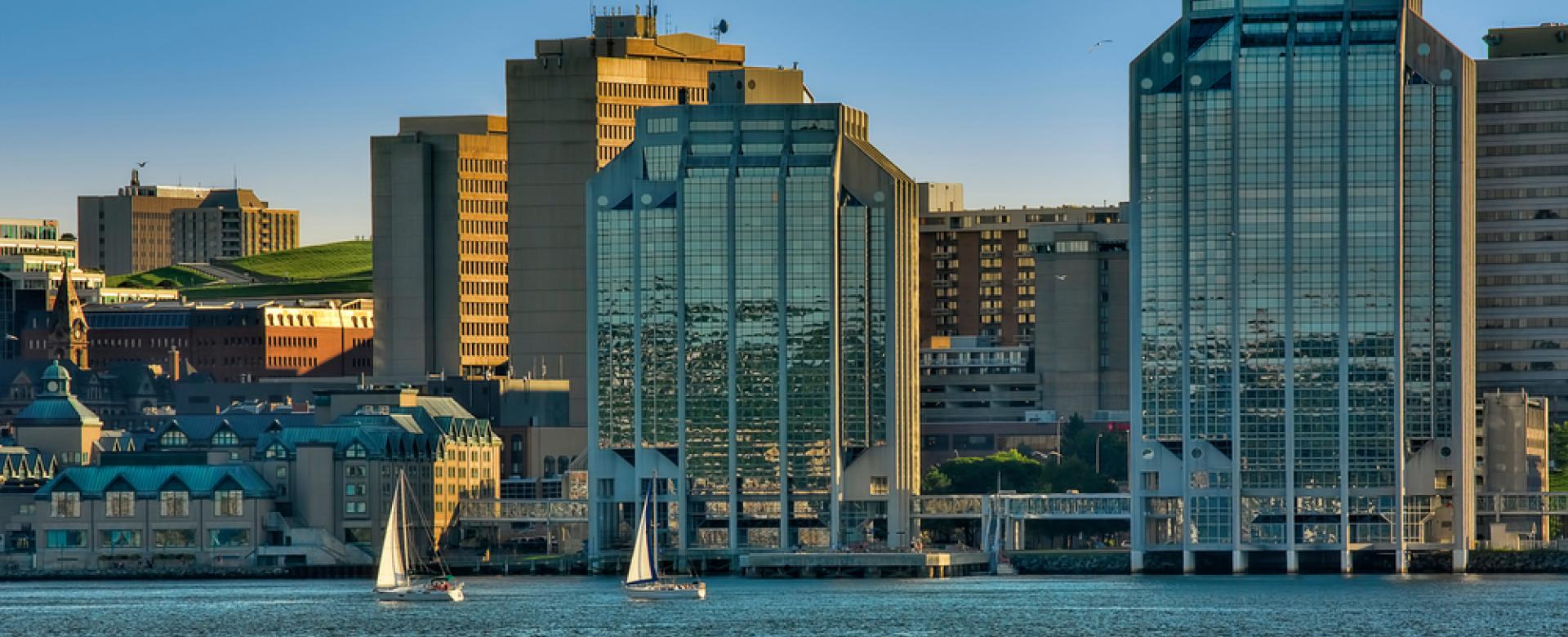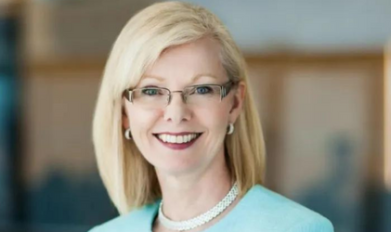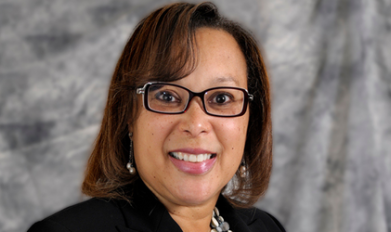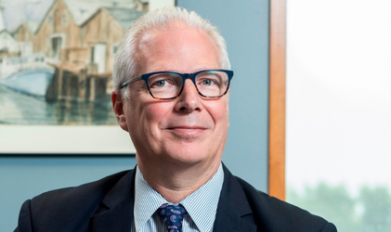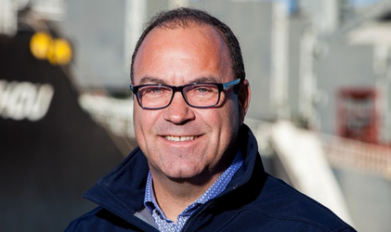Andrea Forbes-Hurley interviews Jim Hanlon, CEO of the Institute for Ocean Research Enterprise (IORE) and the Centre for Ocean Ventures & Entrepreneurship (COVE), to gain insight into how high-impact Atlantic Canadian organizations are optimizing the potential of people to contribute to the region’s growth and prosperity and to discuss how strengthening our workforce can enhance our economic outlook.
Jim Hanlon is the Chief Executive Officer of the Institute for Ocean Research Enterprise (IORE) and the Centre for Ocean Ventures & Entrepreneurship (COVE), a collaborative facility for applied innovation in the ocean sector. Drawing on 40 years of experience in the Canadian tech industry that encompasses aerospace, defence, and the marine monitoring field, Hanlon tells us why Atlantic Canada has a competitive advantage in the oceans sector, how we can build on this, and why places such as Norway and Waterloo, ON, offer a template for achieving our goals.
Q: How has the oceans technology sector, particularly for start-ups, changed from what it was five years ago?
A: There’s a lot more money in the ocean economy in Atlantic Canada thanks to advocacy and proposal work—enough that it is notable even by international standards. From a research standpoint we now have the support of the Ocean Frontier Institute and Canada’s Ocean Supercluster promises to supercharge the country’s business-led ocean economy, but the ocean economy as a whole is particularly buoyant, not just due to shipbuilding activity but also the fishing industry. The fact there is lots of money on the table is helping to create buzz and interest from business people everywhere.
Q: So how do we capitalize on that excitement? What are the some of the opportunities and challenges for growth in this sector that keep you up at night?
A: The biggest challenge we have are ocean tech businesses that are mature and successful, they are generating revenue and profit, but they have not scaled to $100 million in annual revenues because their market is mainly university and government researchers. We need to take that massive commercialization capability and focus it on large markets – the fishing and aquaculture industry, the defence sector, and oil and gas.
Our companies are not connected to the major players in these sectors. The supply chains are so deep, particularly in the oil and gas sector, that it is difficult to gain boardroom access. Also, at least in this region, there is a general lack of awareness in those boardrooms about the breadth and depth of capability in our ocean tech sector, so we need to raise awareness and build those connections. That’s what initiatives such as COVE and Canada’s Ocean Supercluster are designed to do.
Q: What about start-ups in the ocean tech sector? What are some barriers they face?
A: This is a hard business to get into. It’s not like IT where, if you understand the application and implementation, and you can code, you can launch a business before you even graduate. Ocean tech products require considerable expertise and resources to launch, so they tend to be the domain of someone with extensive sector experience.
If we want to encourage more start-ups, we need to identify and engage latent entrepreneurs who are currently employed. Perhaps the biggest and best source is the Navy. The Department of National Defence is Nova Scotia’s largest employer, and they train their people extraordinarily well. When people leave the Navy, they are typically in their early 40s, have subject matter expertise that is second to none and a pension they could use to launch a business.
There is also considerable core competency in the fishing industry we could tap because they know the technological tools that would make their businesses more profitable.
There’s still a role for student entrepreneurs in the sector, but my view is that the best thing they can do is to get a job working in an ocean industry for a few years after school before starting a business. They will be way more credible to investors.
Q: What can we do to encourage this audience to become entrepreneurs?
A: We need to keep getting the word out that the ocean technology sector offers interesting opportunities to become entrepreneurs. It’s not nascent or aspirational. We’re strong in ocean technology and have been for probably 60 years. But we also have a supply chain, trained people, and a market, so we have a competitive advantage. If you ever wanted to be an entrepreneur and do that successfully while living in Atlantic Canada, oceans would be the business to get into.
Q: If we want to encourage more people to start new companies, how will we ensure they have access to talent? What will we need to do to grow, attract and retain a skilled workforce?
A: We need more young people with backgrounds in science, technology, engineering and mathematics (STEM) coming into the ocean technology sector. And we need to engage the students who are gifted in those areas while they are still in high school. COVE has been reaching out to science teachers throughout the region to use the ocean as a delivery mechanism for STEM, but we need to ensure that the focus is on quantitative training not just on observational science. We also need to focus on parents and the academic choices they are making for their children as early as grades six and seven. By engaging parents, students and teachers on the potential of the ocean sector, we can develop the physicists, engineers and quantitative business people we need to populate this industry.
We also completed a needs assessment of the ocean sector and although employers say their employees have strong technical skills, they were typically lacking in soft skills such as project planning, communication and persuasiveness. That suggests there is something lacking in the education paradigm, and our post-secondary institutions are aware of these deficiencies, but it takes time for them to add these skills to the curricula. Thus, extracurricular learning, such as co-op programs, makes a big difference, because that is where undergraduate students can learn those skills.
Q: If STEM and soft skills are currently in high demand, what do you predict will be the skills priority in ten years?
A: The deep data related to the ocean is where the big opportunities will be, which means we need professionals trained in computer science with a specialty in oceans. This is something that COVE is tackling in partnership with IBM Canada, Dalhousie University’s Faculty of Computer Science and ACOA through DeepSense, a $30 million initiative to create the next generation of ocean data scientists.
Q: What could be the potential impact of investments and initiatives such as DeepSense for not only the ocean sector but our economy.
A: The holy grail is better business predictions related to the ocean environment. Traditionally, we have not been able to make informed business predictions about the fishery, do marine weather forecasting, or grasp the circulation of the ocean. This has led to instances of overfishing because of imprecise quota management and ill-informed deployment of capital in coastal infrastructure. The more we focus on skills, entrepreneurship, and building this sector, the better our expertise will be in gathering sensor data for improved modeling and more informed business projections and decisions.
Q: And thus the ocean sector would play a stronger role in our economy?
A: Exactly. It really plays to our strong suit. By my measure, the ocean sector accounts for as much as 18 per cent of Atlantic Canada’s economy. By contrast, it is less than 2 per cent nationally, so it matters a lot to our region.
The problem is, this is not an ocean country. Our large population centres are not near the ocean, which is the inverse of Europe and the United States. For that reason, we need to think of ourselves less as provinces and more as one region. Look at a nation like Norway, which has a similar geographic size to Atlantic Canada. The ocean drives their economy – it accounts for almost 40 per cent of GDP. That could serve as a model for us to work together. We also need to recognize that, as a region, we have more synergy with New England, whose economy is comparable to ours, despite drastic population differences. We need to look for partnership and business opportunities there, not Toronto and Montreal.
Q: In that light, what can we do as a region to support the sector and its growth?
A: I think we need to find more opportunities to collaborate. I think you’ll see that happen through initiatives like the Ocean Frontier Institute and as a new generation of bureaucrats and administrators take office because they will recognize the need for consolidation.
I think we also need to look at ways to enhance retention of young people in small towns where the fishing industry is particularly active. It’s not just jobs that are a deciding factor in whether or not young people stay in smaller towns. It’s sociological factors, such as whether there are movie theatres or nightclubs. It’s also about providing vital infrastructure such as transportation corridors, hospitals and, most important of all, access to high-speed internet, because if you do not have that, you can’t be an effective entrepreneur in this information-driven age. That being said, there is world-class, relevant expertise in many of our smaller centers, particularly relating to the fishing industry.
Q: If you take a multi-sectoral view of our region, what do you predict will be the defining change in the Atlantic Canadian workforce over the next 5 to 10 years?
A: I think you’ll see more interest in entrepreneurship in our workforce. For a long time, particularly in Nova Scotia, a government position was promoted as the optimal career goal. Our post-secondary system was primarily set up to prepare young people for that, or for mid-level employment with a large company. We are moving away from that. People in their late 20s and early 30s are more comfortable with the idea of striking out on their own, so the region’s start-up culture is going to be much stronger across all sectors, which is a good thing.
Again, the laggard to some extent has been the post-secondary education system, but we have seen some great progress there thanks to leaders such as Richard Florizone. Now that he’s stepped down as President, we need someone to continue what he has started at Dalhousie University to foster a more entrepreneurial culture and achieve what a community like Waterloo, ON, has done. Twenty years ago, no one would have picked it as a winner, but it rebounded from the loss of its main industry to become a hotbed of tech, entrepreneurship and business. I think there’s a similar vibe taking root here, and I think we will see a more positive attitude in this region toward development, entrepreneurship and growing our economy, and that is exciting.
About Atlantic Leader Insights
Atlantic Canada’s economy is fueled by a diverse array of private and public sector entities that employ thousands of people and contribute to our region’s growth and prosperity. But how are these organizations optimizing the potential of their people, and what insights have they gained about the future of our economy from their innovative initiatives?
KBRS recognizes the critical importance of attracting, developing and retaining inspiring leaders and top talent within Atlantic Canada. We sat down with leaders at several high-impact Atlantic Canadian organizations to talk about our region’s opportunities and challenges. This article is one in a series that aims to collect these leaders’ insights on how we can enhance our economic outlook by strengthening our workforce.

CEO, Institute for Ocean Research Enterprise, 2012 - 2020


